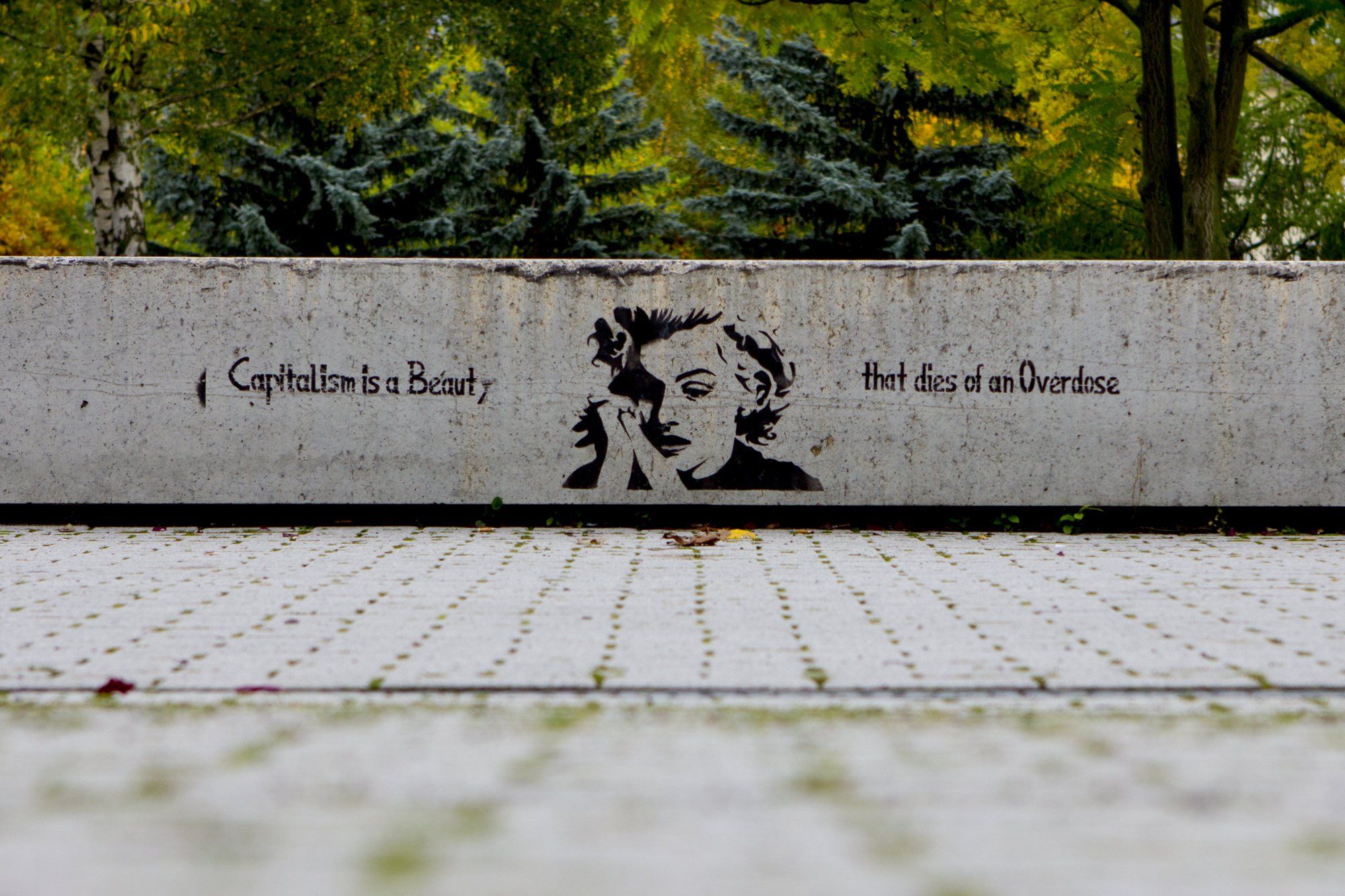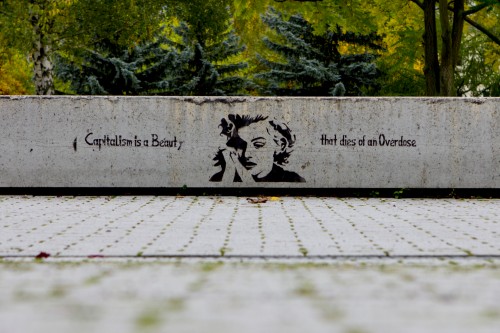Sometimes I return to writing out of inspiration, sometimes out of need, and sometimes through an indirect kick in the pants. Despite my dereliction, I had a post half-written in a journal somewhere, because I love how writing by hand slows the process of thinking about structure and cadence. Enough to make writing so much smoother. But that post is still mostly crap. And so you get this.
The photo below comes from some local graffiti in Erfurt, which is the tiny little forest-city in the middle of Germany that I’ve finally arrived at. It’s in the former East Germany, which explains the uptick in novel political slogans painted on the walls (but not why they are in English), and why a colleague from Eritrea has begun noticing an apparent increase in impoliteness towards him.
I’ve heard alternate accounts about the relative dangers of xenophobic right-wingers in this part of the world that range from “Oh lawd, it’s like Deliverance, but German”, to “Nah, it’s a minority of incidents, and mostly dealt with. The real problem is in X town.” Where the town in question is somewhere further east. I’ve come across that tactic before in South Africa.
Still, yesterday’s university orientation included telling us where to find a safe refuge house in the evenings in the case of xenophobic attacks. So, that’s a thing.
Also, it broke my heart to watch two teenage girls taunt and follow an old woman all around the center of town for about half an hour on Sunday for sport. I had just hoped that broken and cruel human relationships were something South Africa had a monopoly on, I guess. It comes as a wake up to realise that even here the work of seeing each other as complete human beings is an ongoing project.
Yesterday was for tours of the town proper (it’s beautiful), and lessons on how you assemble a curriculum for yourself (it’s complicated). Other than understanding that I have marginally less choice of subjects than my non-conflict-specialising classmates, I am still not entirely clear on how we choose courses to make up the required amount of points.
But there is some online tool which is called Elvis, and something about an academic mentor who is presumably not. And between them, I am sure they will disallow the most egregious registration offences I can think of making. The course list has some really interesting topic options (like forced migration), some less interesting ones (European neighbourhood policy), and some I wouldn’t touch with someone else’s notepad out of the near-certain belief that they will be full of provocative and idiotic opinions (understanding the Israel-Palestine conflict).
What’s interesting, poring over the course options, pen in hand, is how different the ideas of things like politics, society, power and the role of something like public policy seem to be here. Not so much in the complexity of the material, as the kinds of ideas about the world and society that underpin it. Coming to study as a (South) African, I am starting to realise, means coming from a particular field of ideas that may well – perhaps almost certainly – wouldn’t be regarded as credible grounds for public policy decisionmaking. I knew Rhodes was left of centre, but this, quite frankly, may be ridiculous.
In my last days in London – and thanks to the inspired organising of Katherine – I got to join the first session of a reading group in a room above the local pub. The book in question being The Wretched of the Earth by Frantz Fanon, which – if you haven’t read it and are even the slightest bit interested in violence and postcolonialism – you really should read. People have written whole theses on the man and his ideas, but he remains unappreciated in the wider world, though as relevant as ever to the neocolonial instincts embedded in things like the war on terror, or the asinine ‘Africa Rising’ discourse of the last couple of years.
And I’m sorry for using words like neocolonial, or discourse. I just can’t think of better ways to be succinct. No apologies for asinine. It’s a beautiful little word that should really get more days out. But digressions…
In an opening chapter, Fanon talks about the violence that comes out of the colonial experience. That being dominated, humiliated and corralled by a system that is fundamentally engineered to keep you that way can, in the end, lead to violence as an entirely rational response to the circumstances in which you find yourself. That ‘the system’ – in the sense of governments, rules, laws and their enforcers – are able to keep the oppressed in their metaphorical chains because they keep a monopoly on the right to use force. Think of what police do to protestors as a literal example of the principle.
In such a situation, there can be no diplomatic, nonviolent solution to the structural oppression, because those groups who benefit from and control the overall arrangement of power may be willing to negotiate to a point, but never so far as to overturn the system itself. Accommodations can be made to include representatives of some of the oppressed, but the overall form of the world – the need to oppress and exploit – will not be given up. And need not be as long as those in control (the colonizers in Fanon’s paradigm) have the recourse to overwhelming violence to keep it in place.
And so, in such a configuration, overwhelming violence against the system is simply the rational means of taking back your dignity. Of freeing oneself from conditions that are oppressive, dehumanising, systematically and personally violent. Ironically, violence is the means – in a sense – for pursuing a more just and humane society.
In those claims, and with that perspective, Fanon reclaims violence from being illegitimate. And argues not simply that violence – in certain circumstances – is a valid action, but that it may, in the final analysis, be the only way to overcome a world built to deny human dignity and equality. There’s more, of course. Like pointing out that the rhetoric of nonviolence can be seen not as some noble pursuit in healing, but in asking those most oppressed by the violence of the government to step back from the most productive power they have to wield in their defence.
Even Fanon would not claim all violence as noble, for sure. The violence of the oppressor – being the thing to be smashed – would be excluded. As would the violence, presumably, of the profiteering warlord. Or pretty much all violence directed at creating a new oppression.
But there remain real and problematic examples of legitimate rebellion. The communities in South Africa who fight murderous policemen and criminal government officials for the right to exist as dignified human beings come to mind first. And what then, of them?
What is the place of something called ‘public policy and conflict management’, when public policy (from the perspective of the state) means wielding laws and powers to preserve or further the dehumanisation of communities? And conflict ‘management’ is but a euphemism for asking those who are last in society to wait out their lives in peaceful squalor, hoping for a job, a toilet, education or a decent house. Laws and policies are important. But they are, in the end, simply the imaginations of men – rhetoric made into forms of power.
To the extent that questions of public policy, and reactions to violence are important, they are important after more fundamental questions of justice. And make no mistake, those questions are fundamental.
Which brings us, to the land north of the Mediterranean. Where justice isn’t inflected with the colossal ghost of colonialism, or the particularity of the South African experience. Insofar as things like apartheid can be regarded as curiously particular, and not the end point of a rapacious capitalism, that is.
There are different histories here. Different stories of things like the legacy of the country’s partition that I know so little about, and thuggish right-wing politics, about which I probably know more. But I also wonder, skimming course outlines, how far the stories over here would play nicely with the ideas of people like Fanon. The thinking that sees grand, structural oppression, and grapples with how it could be overcome. The acknowledgement that we still need that revolution in compassion, not simply more efficient resource allocation, aid or negotiation. Increasing life expectancy and educational outcomes is great. But not when the life lengthened is valued for its labour potential. And when the education more widely accessed is wrapped in the chains of ‘earning potential’, ‘skills building’ and other discourses designed to create a stunted, limited human creature.
I suppose what’s preoccupying my mind, in a long and winding way, are questions of the ethics of public policy, and of seeking always to ‘manage’ conflicts. That, and a nervous wondering of how well my South African ideas of justice will comport with those of the school here. All ideas change, adapt and grow of course. But that’s different to claiming that all ideas should be changed. Not everything can, or should be treated as a relative perspective. But it can be hard, sometimes, to tell the difference.
It’s a thing, I guess, I’m struggling with.


